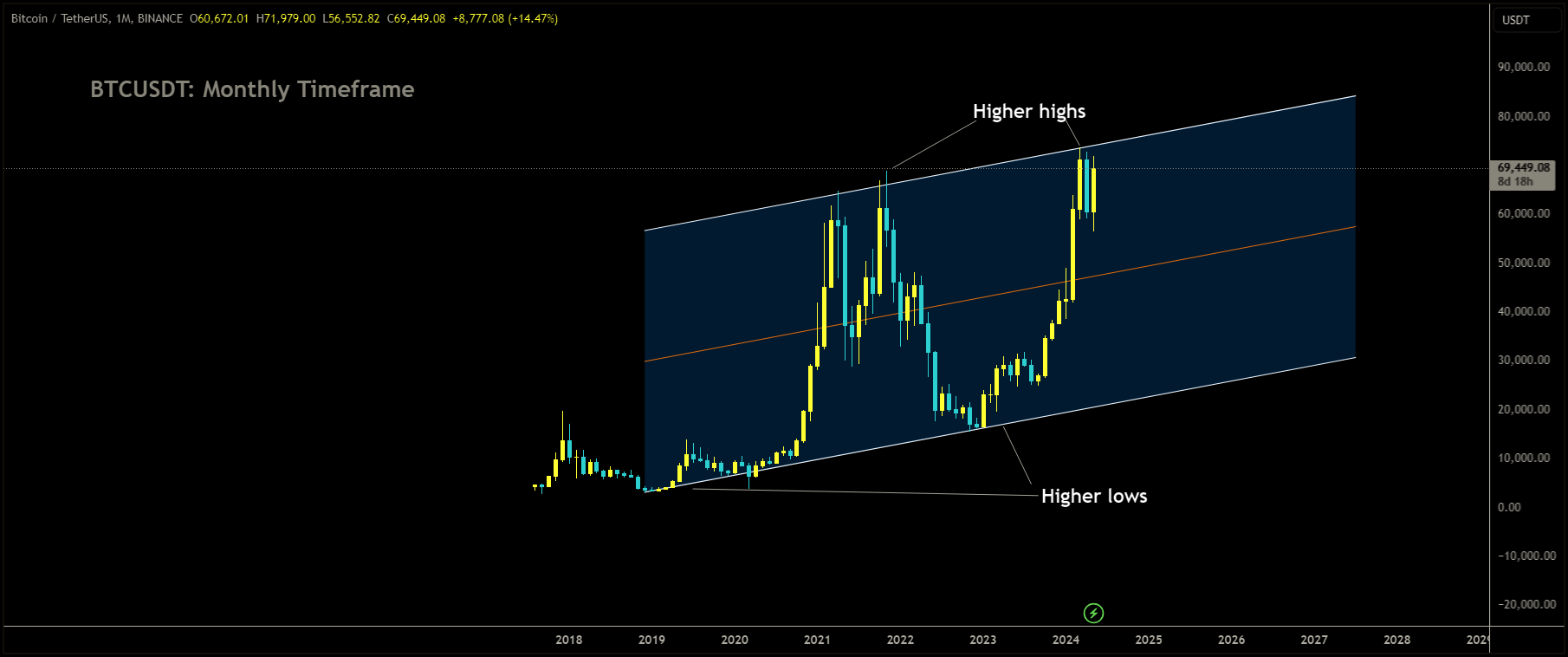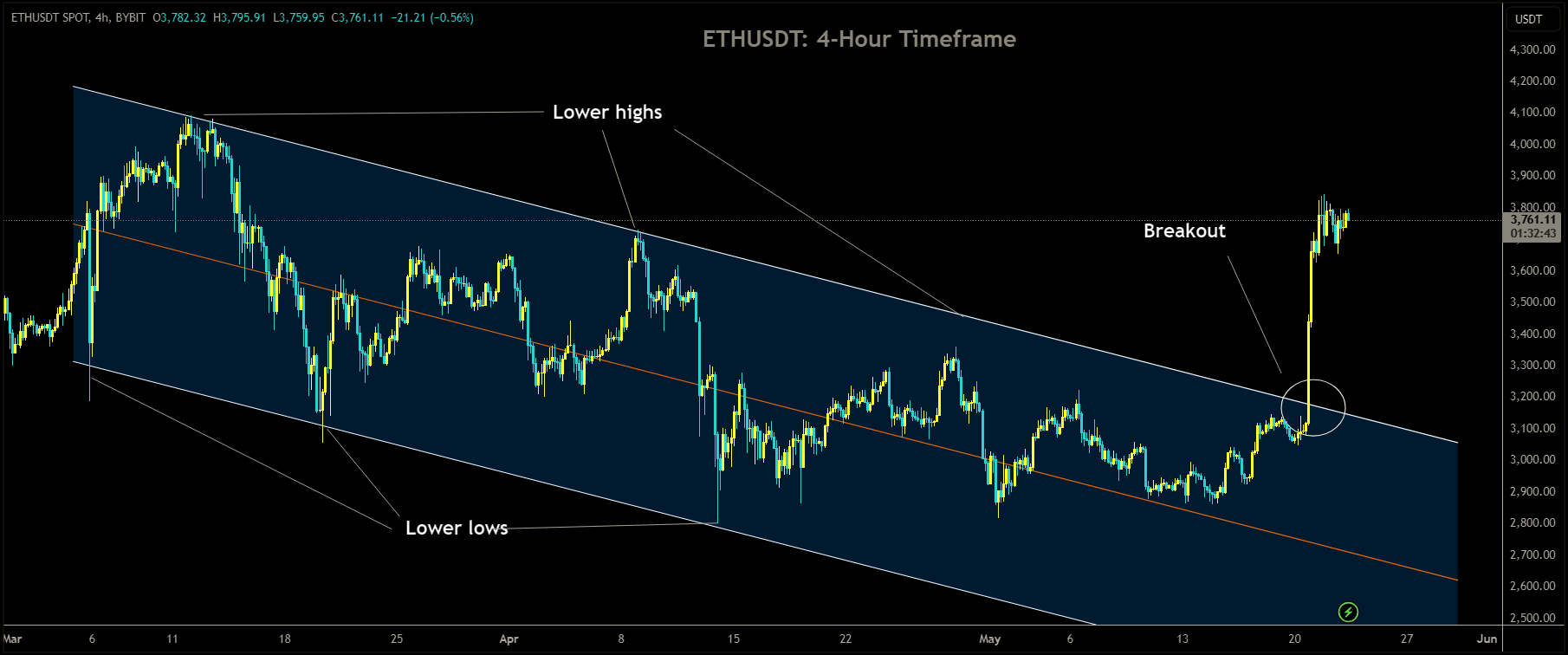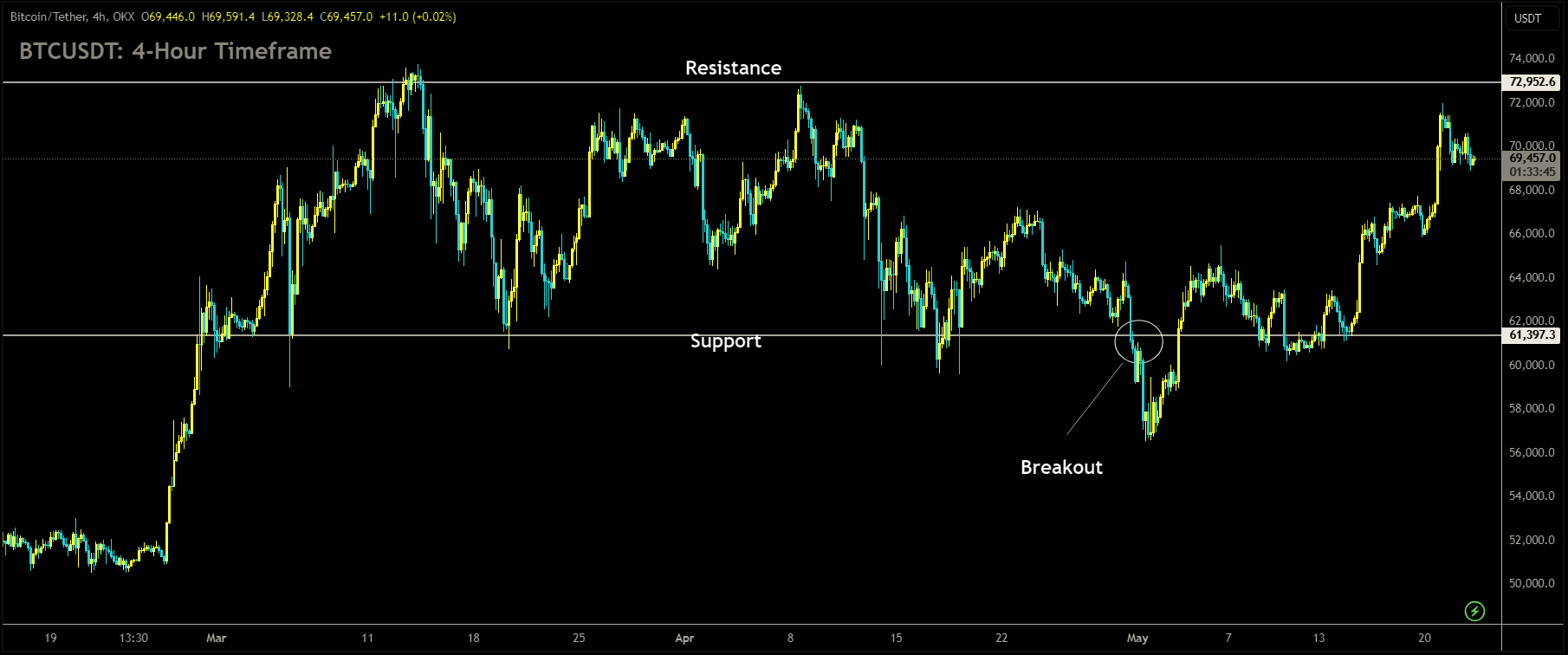BTCUSDT: US House Passes Crypto FIT21 Bill with Strong Democratic Backing
US House of representatives approved the FIT-21 Crypto Bill to Senate with a Vote of 279-136 Win in the House of representatives. 208 republicans and 71 Democrats favor for passing this bill. US President Joe Biden also do favor for this Bill if Senate committee passed. This is the Financial evolution of Digital assets regularization to avoid the money laundering, illegal activities by Crypto assets in the US.

BTCUSDT is moving in Ascending channel and market has reached higher high area of the channel
The U.S. House of Representatives voted 279-136 to approve the Financial Innovation and Technology for the 21st Century Act (FIT21) with significant support from House Democrats.
This legislative milestone marks the most substantial achievement for the crypto industry in Congress, as it paves the way for establishing regulations for digital assets markets. The bill’s passage represents the first time a major crypto bill has cleared one of the chambers of Congress.
The FIT21 Act now advances to the U.S. Senate, where its fate is uncertain due to the lack of a counterpart bill. While the future of the bill remains unclear in the Senate, its approval in the House is a significant step forward for crypto regulation in the U.S., considering the country’s lag behind other global jurisdictions in establishing comprehensive regulations for digital assets.
Rep. Josh Gottheimer (D-N.J.) highlighted the need for regulatory clarity, emphasizing the bipartisan nature of the legislation and urging collaboration to ensure its success.

The vote breakdown saw 71 Democrats and 208 Republicans voting in favor of the bill, while 3 Republicans and 133 Democrats opposed it. President Joe Biden expressed opposition to the bill through a policy statement, although he did not threaten to veto it, as he had previously done with other crypto-related legislation.
The legislation, primarily driven by House Republicans, aims to regulate the U.S. crypto markets by setting consumer protections and designating the Commodity Futures Trading Commission (CFTC) as a key regulator of digital assets. It also seeks to clarify the classification of crypto tokens as securities or commodities.
Opponents of the bill, led by Rep. Maxine Waters (D-Calif.), argued that it would grant undue leniency to crypto businesses that have evaded securities laws. However, the majority of proposed amendments, including those by Reps. Greg Casar (D-Texas), Brittany Pettersen (D-Co.), Ralph Norman (R-S.C.), and Scott Perry (R-Pa.), were adopted, further shaping the bill’s provisions.
BTCUSDT: US House Passes Crypto Regulation Bill
The U.S. House of Representatives approved the FIT-21 Crypto Bill, sending it to the Senate for further consideration. The bill secured a vote of 279-136 in favor within the House of Representatives, with 208 Republicans and 71 Democrats supporting its passage. Notably, U.S. President Joe Biden also expressed his support for the bill, contingent upon its approval by the Senate committee.

ETHUSDT has broken Descending channel in upside
The FIT-21 Crypto Bill represents a significant step in the financial evolution of digital assets regulation in the United States. Its primary objective is to address issues related to money laundering and illegal activities facilitated by crypto assets within the country. By establishing a regulatory framework for digital assets, the bill aims to enhance oversight and mitigate risks associated with the crypto industry. If enacted into law, it would provide authorities with tools to monitor and regulate crypto transactions, thereby safeguarding against financial crimes and illicit activities perpetrated through digital assets.
The U.S. House of Representatives passed a significant crypto market structure bill aimed at regulating the industry, marking the first comprehensive crypto legislation to be voted on in the full House.
The Republican-led Financial Innovation and Technology for the 21st Century Act (FIT21) received a vote of 279 to 136, with seventy-one Democrats supporting the bill, including former Speaker of the House Rep. Nancy Pelosi of California.
FIT21 aims to establish a regulatory framework for digital assets, granting more power and funding to the Commodity Futures Trading Commission (CFTC) to oversee crypto spot markets and “digital commodities,” particularly bitcoin. The bill also addresses stablecoins and anti-money laundering provisions.
Despite its passage in the House, FIT21 is unlikely to be considered by the Senate this year. However, it sets the stage for potential legislative action in the next Congress in January.
House Financial Services Chair Patrick McHenry emphasized bipartisan support for FIT21, stating his commitment to advancing the legislation before the end of his term in January 2025.
The bill’s passage reflects a shifting perception of the crypto industry in Congress, with Ron Hammond of the Blockchain Association describing it as a “massive turning point.”

However, FIT21 has faced criticism, with House Financial Services Committee Ranking Democrat Maxine Waters describing it as one of the worst bills she’s ever seen.
While the White House has expressed opposition to FIT21, it remains open to working with Congress on a regulatory framework for digital assets.
The passage of FIT21 in the House follows the Senate and House’s approval of a measure withdrawing a Securities and Exchange staff accounting bulletin related to crypto custody.
BTCUSDT: FIT21 Crypto Bill Clears US House: What Comes Next?
The FIT-21 Crypto Bill has gained approval from the U.S. House of Representatives, advancing to the Senate with a decisive vote of 279-136. Within the House, 208 Republicans and 71 Democrats supported the bill’s passage, signaling bipartisan consensus on its merits. President Joe Biden has indicated his support for the bill contingent upon its approval by the Senate committee. This legislative initiative represents a pivotal moment in the financial evolution of digital assets, aiming to establish regulatory measures to combat money laundering and illicit activities associated with cryptocurrencies within the United States.

BTCUSDT is moving in box pattern and market has fallen from the resistance area of the pattern
The FIT21 bill, formally known as the Financial Innovation and Technology for the 21st Century Act (H.R. 4763), has successfully passed the United States House of Representatives, marking a significant milestone in the legislative journey toward clarifying the roles of securities and commodities regulators in overseeing the crypto industry. The bill received bipartisan support, with 71 Democrats and 208 Republicans in favor, while 136 members voted against it.
Despite its approval in the House, the fate of FIT21 in the Senate remains uncertain, especially considering the absence of a companion bill and potential opposition from notable critics such as Senator Elizabeth Warren. The Senate may take months to deliberate on FIT21, and if it progresses, the bill will undergo committee reviews, hearings, and markups before facing a final vote requiring a majority of 51 senators for passage.
Throughout this process, amendments to FIT21 may be proposed, and differences between the House and Senate versions will need to be reconciled through negotiations between members of both chambers. Ultimately, the bill will return to the House and Senate for final approval before reaching President Joe Biden’s desk.

President Biden has ten days to sign or veto FIT21 once it reaches him. While his administration expressed opposition to the bill, no indication of a potential veto has been provided. However, even if President Biden were to veto FIT21, Congress could override his decision with a two-thirds majority vote in both the House and Senate.
The passage of FIT21 in the House has been met with optimism from the crypto industry, viewed as a significant step towards establishing clear regulatory frameworks. However, SEC Chair Gary Gensler voiced opposition to FIT21, citing concerns about potential regulatory gaps and risks to capital market stability. Despite differing opinions, the bill’s passage reflects broader discussions about regulatory oversight and the evolving landscape of cryptocurrencies.
🔥Stop trying to catch all movements in the market, trade only at the best confirmation trade setups
🎁 60% OFFER for Trading Signals 😍 GOING TO END – Get now: https://forexfib.com/offer/




